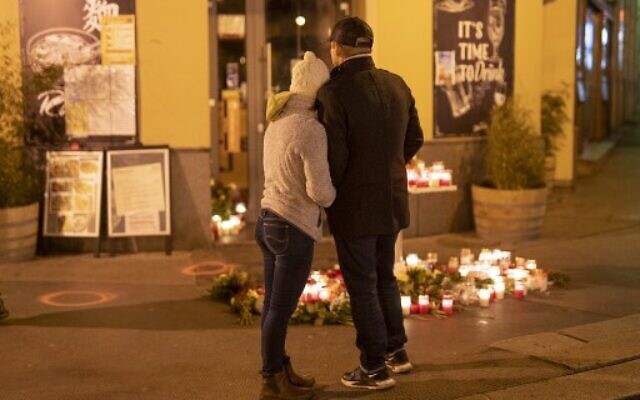VIENNA, Austria (AFP) — Shalom Berntholz never closes his kosher restaurant in central Vienna, but as a new coronavirus-induced lockdown approached, he decided to shut early. That saved his life.
A gunman who supported the Islamic State (IS) group kicked off his shooting rampage on Monday evening right in front of his closed restaurant, killing a waitress opposite.
“Normally, we’re open 365 days a year, even for Shabbat and Jewish holidays. Exceptionally, we closed. That’s what saved our lives,” Berntholz told AFP.
His restaurant “Alef Alef” is located on the ground floor of a white building that houses the offices of IKG, a body that represents Vienna’s Jewish community and counts some 7,000 members.
The gunman, named as 20-year-old dual Austrian-Macedonian national Kujtim Fejzulai who was shot dead by police after killing four people, “started right at the foot of this building,” said Berntholz.
“Perhaps he saw there was nothing on our side and fired his gun opposite and killed that poor waitress.
“You might think that it was also the Jewish community he was targeting, but in truth we will never know.”

A couple standing in front of a restaurant the place of the terrorist attack in Vienna, Austria on November 4, 2020. (Photo by JOE KLAMAR / AFP)
Fejzulai, who was born in Vienna and whose parents come from North Macedonia, opened fire around 8 pm in this small, cobbled square where several popular bars and restaurants are located, as well as Jewish community offices.
Investigators have not yet been able to determine if the gunman was targeting the square’s Jewish locations, or if he just picked this place for its lively nightlife.
Traumatic scenes
The attack claimed by IS also took place just a dozen meters away from a building that symbolizes the city’s rich Jewish history: the “Stadttempel,” a magnificent 19th century synagogue.
It is the only synagogue in Vienna to have survived the Second World War and the “Night of Broken Glass” on November 9-10, 1938 — a pogrom against Jews carried out by paramilitary Nazi forces and civilians.
Before the Second World War, there were some 192,000 Jews in Austria, nearly four percent of the population.
More than 115,000 fled the country after the Nazis took control. Most of the remaining Jews were deported to ghettos and concentration camps.
A community reduced to almost nothing slowly built up again post-conflict.
Monday’s gun rampage has revived memories of attacks against the Stadttempel synagogue in 1979 and 1981 by extremist Palestinian groups, with two people killed in the latter.

Bullet holes are marked on a door at the crime scene in Vienna, Austria, Tuesday, Nov. 3, 2020. Several shots were fired shortly after 8 p.m. local time on Monday, Nov. 2, in a lively street in the city center of Vienna.(AP Photo/Matthias Schrader)
The European Jewish Congress on Tuesday said it “brings back tragic memories for us as one of the first attacks on Jewish targets in Europe happened at this very spot almost 40 years ago.”
Yoav Ashkenazy, a 38-year-old Israeli who has lived in Vienna for six years to study philosophy, decided to come see the scene of the attack with his own eyes.
He refuses to give in to fear.
“People walk around here with a kippah without any problem,” he said.
“Vienna is a city on a human scale, provincial and to the left… No one, not even from the Muslim community, even considers touching a hair on the head of a Jewish person.”
The city’s Jewish community — unlike that in Paris, Brussels, Copenhagen or Germany — has had a general feeling of living in a safe country that had until now been spared jihadist attacks.
Still, 550 anti-Semitic incidents — almost half of which were attributed to the far-right — were reported in 2019 in Austria, a figure that has doubled in five years.
Related posts:
Views: 0
 RSS Feed
RSS Feed















 November 5th, 2020
November 5th, 2020  Awake Goy
Awake Goy  Posted in
Posted in  Tags:
Tags: 
















